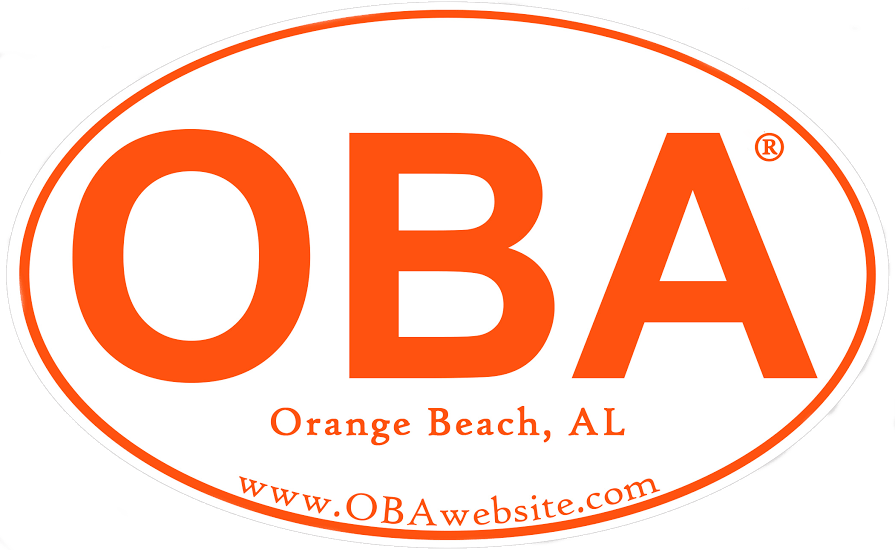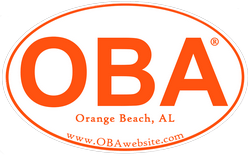OBA No Wake - No Motor Zones
OBA No Wake | No Motor Zones
No Wake, No Motor Zones and some of the boating rules in the Orange Beach Area.
Areas in Blue are No Wake Zones - Areas in Red are No Motor Zones
A Few Boating Rules
- Operating a vessel or personal watercraft under the age of 12. Must be 14 years old and have a vessel license to operate a vessel or personal watercraft alone.
- Operating a vessel in such a manner and at a rate of speed as will create a hazardous wash or wake when approaching or passing another vessel or when entering or leaving a harbor or marina area.
- No person, except in jump buoys and like objects used normally in competitive and recreational skiing, shall operate or manipulate any vessel, tow rope, or other device by which the direction or location of water skis, aquaplane, or similar device may be affected or controlled in such a way as to cause the water skis, aquaplane, or similar device or any person thereon to collide with or strike any object or person.
- Operating a vessel towing a person or persons on water skis, or an aquaplane or similar device unless there is in the vessel a person, in addition to the operator who is at least 12 years of age and is observing and is capable of communicating to the operator the progress of the person being towed or unless the vessel is equipped with a wide-angle mirror with a viewing surface of at least 500 sq. centimeters (78 square inches) and a field of vision of at least a 170 degrees.
- Operating a vessel above plane speed when persons or equipment are positioned in a manner that would obstruct the operator's view or impair the safe operation of the vessel. (Sailboats are exempt from this section)
- Operating a vessel in violation of any established speed zone.
- Operating a vessel after April 28, 1999, which violates federal laws regulating the horsepower of the engine of the vessel.
- The exhaust of every internal combustion engine used on any vessel shall be effectively muffled by equipment so constructed and used as to muffle the noise of the exhaust in a reasonable manner. It is unlawful for any person to operate or give permission to operate any vessel powered by an engine or outboard motor in such a manner as to exceed a noise level of 86 decibels measured at a minimum distance of 15.2 meters (50 feet) from the vessel. The use of cutouts is prohibited, except for vessels competing in a regatta or official boat race, and for such vessels while on trial runs.
- Sponsoring a regatta, race, marine parade, tournament, trial runs, or exhibition without providing adequate protection from marine traffic, interference and hazards and obtaining a permit at least 15 days prior to the event.
- No person shall operate or give permission to operate any vessel on the waters of this state towing a person or persons on water skis, surfboard, spinners, or other similar devices unless such person or persons being towed are wearing a Type I, II, III, or Type V U. S. Coast Guard approved personal flotation device (PFD).
- Operating or giving permission for the operation of any vessel unless the vessel is currently registered and numbered in accordance with laws and regulations.
- No person shall operate any vessel on the waters of this state within 244 meters (800 feet) below a hydro-electric dam and/or navigational lock and dam unless each person aboard, including the operator, is wearing a U. S. Coast Guard approved personal flotation device Type I, II, III, or V. Such personal flotation device will be worn and securely fastened in accordance with manufacturer's instructions and recommendations for such personal flotation device.
- No vessel shall be loaded with passengers or cargo beyond its safe carrying capacity, taking into consideration weather and existing operating conditions.
- No person shall moor to, except in emergencies or interfere with, destroy, submerge, climb upon, damage, move, or cause to be removed from its mooring, any regulatory signs, markers, or aids to navigation.
- No person shall operate or give permission for the operation of a vessel which is not equipped with safety equipment required by law.
Boating Under the Influence
No person shall drive or be in actual physical control of a vessel or manipulate any water skis, aquaplane, or any other marine transportation device while:
- there is 0.08% or more by weight of alcohol in the blood.
- under the influence of alcohol.
- under the influence of a controlled substance.
- under the combined influence of alcohol and a controlled substance.
- under the influence of any substance which impairs the mental or physical faculties of the person.
- Refusal to submit to a field breath test or other approved testing shall result in the same punishment as provided for operators of motor vehicles on the state highways (automatic suspension of vessel license).
Water Traffic "Rules of the Road" in the State of Alabama
- Vessels passing head-on shall keep to the right.
- Vessels overtaking another vessel may do so on either side but must grant the right-of-way to the vessel being overtaken.
- When vessels are passing at right angles, the vessel on the left will yield the right-of-way to vessel on the right.
- Motorboats shall yield the right-of-way to non-motor powered boats except as follows:
- When being overtaken by non-powered vessels.
- For deep draft vessels that have to remain in narrow channels.
- When a vessel is towing another vessel.
- Motorboats must maintain a direct course when passing sailboats.
- Any vessel approaching a landing dock or pier shall yield the right-of-way to any departing vessel.
- Any vessel departing shoreline or tributary shall yield the right-of-way to through traffic and vessels approaching shoreline or tributary.
- Vessels will not abruptly change course without first determining that it can be safely done without risk of collision with another vessel.
- If an operator fails to fully understand the course of an approaching vessel, he must slow down immediately to a speed barely sufficient for steerage-way until the other vessel has passed.
- Vessels yielding right-of-way shall reduce speed, stop, reverse, or alter course to avoid a collision. Vessel with right-of-way shall hold course and speed. If there is danger of collision, all vessels will slow down, stop, or reverse until danger is averted.
- Vessels will issue warning signals in fog or thick weather.
- No mechanically propelled vessel shall be operated in a circular course around any other vessel or any person swimming.
- In a narrow channel, vessels will keep to the right of mid-channel.
- Vessels approaching or passing another vessel shall be operated in such manner and at such rate of speed as will not create a hazardous wash or wake.
- No vessel shall obstruct or interfere with take-off, landing, or taxiing of aircraft.
- All vessels shall be operated at reasonable speeds for given situations and must be under the complete control of the operator at all times.
- No person shall, under any circumstances, operate a vessel in excess of an established speed zone.
- No vessel or person shall obstruct or block the navigation channel, entrance to the channel, mooring slip, landing dock, launching ramp, pier or tributary.
- Vessels shall keep at least 100 feet clearance of displayed diver's flag.
- Operator shall maintain a proper lookout.

